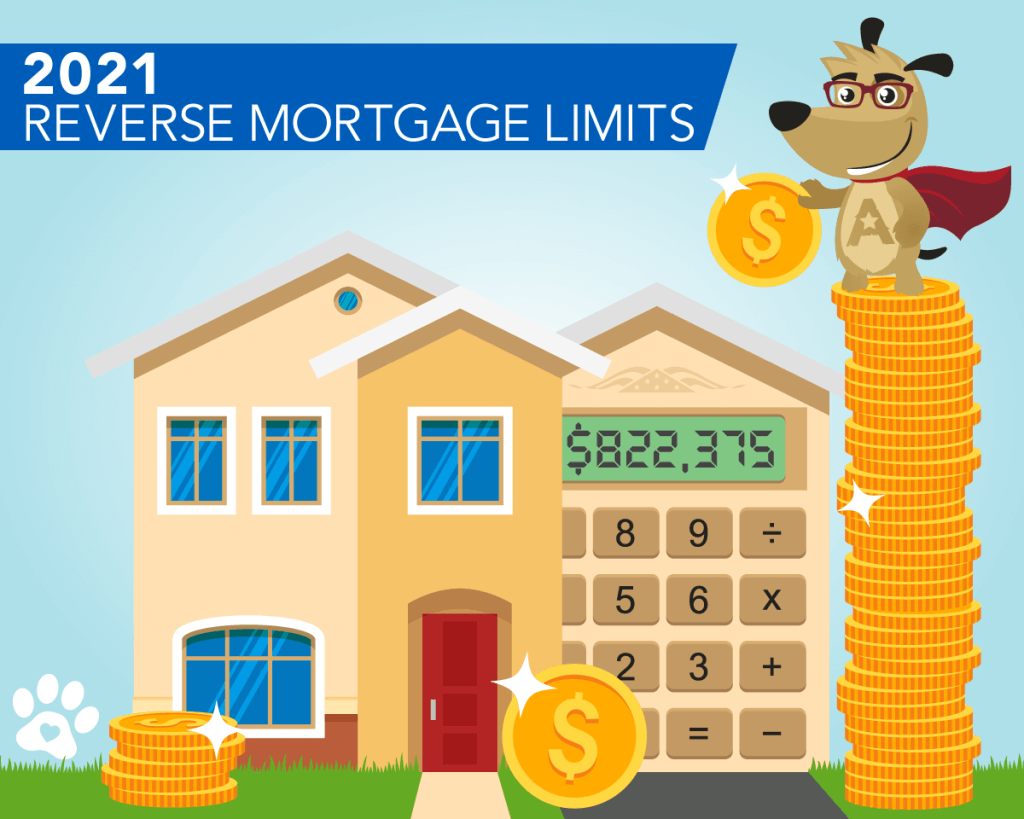
CALCULATE 2021 HECM LIMITS.
2021 Reverse Mortgage Limits Soar to $822,375
 |
Michael G. Branson, CEO of All Reverse Mortgage, Inc., and moderator of ARLO™, has 45 years of experience in the mortgage banking industry. He has devoted the past 20 years to reverse mortgages exclusively. (License: NMLS# 14040) |
 |
All Reverse Mortgage's editing process includes rigorous fact-checking led by industry experts to ensure all content is accurate and current. This article has been reviewed, edited, and fact-checked by Cliff Auerswald, President and co-creator of ARLO™. (License: NMLS# 14041) |
BREAKING: 2023 Reverse Mortgage Limits Reach All-Time High $1,089,300!
2021 Reverse Mortgage Limits Officially $822,375!
The U.S. Department of Housing and Urban Development (HUD) just announced that the reverse mortgage lending limit for the Home Equity Conversion Mortgage (HECM) program will be raised from $765,600 to $822,325 effective January 1, 2021. The HUD Mortgagee Letter announcing the increase, can be found on the HUD website.
After the limits remained unchanged for many years, this is the 5th year in a row where HUD has raised the lending limit. It had remained stagnant for several years at $625,500 starting in 2009, when the limits were originally raised from $417,000 as part of the American Recovery and Reinvestment Act.
Those limits were considered a temporary increase and, for many years, had to be renewed annually. It was not until 2017 that rising home prices finally supported increases to the lending limits on their own based on HUD’s calculations. Since then, the limits have been (and will be):
History of HECM reverse mortgage lending limits
- 2018: $679,650
- 2019: $726,525
- 2020: $765,600
- 2021: $822,375
- 2022: $937,500
- 2023: $1,089,300
But what does this mean for borrowers?
Without really getting into the weeds, the chart below demonstrates the difference a borrower with a home valued at $822,375 or more will receive with the new limits in 2021 versus what that same borrower would have received under the current 2020 limits:
2021 reverse mortgage limits
AGE 2021 HECM Limits ($822,375) 2020 Limits ($765,650) Difference
65 $444,083 $414,955 $29,827
70 $473,688 $440,985 $32,702
75 $500,826 $466,250 $34,575
80 $527,965 $491,515 $36,449
85 $558,888 $524,436 $34,452
The new limits show that borrowers between the ages of 65 and 85 with properties valued at $822,375 or more will receive anywhere from approximately $31,226 to $34,633 in additional reverse mortgage loan proceeds.
This is always welcome news for borrowers of higher-priced properties, but HUD has already signaled that the agency may change the HECM program to institute regional limits (akin to what is done for forward FHA loans), so it remains to be seen how long the one national limit will remain in place.
Coronavirus and reverse mortgages
Something that has and will continue to affect the prospect of a reverse mortgage in 2021 is the COVID-19 coronavirus pandemic. Over the course of 2020, HUD, and the Federal Housing Administration (FHA) have instituted several relief measures aimed to reduce the economic strain of the pandemic across a whole host of homeowners and renters.
For reverse mortgages, this has translated into the government streamlining certain processes so that reverse mortgage loans can be closed with as little direct human contact as possible, while also making it easier for lenders and borrowers alike to get the approvals they need in the midst of certain business and agency office closures.
Be sure to check with your loan originator or reverse mortgage counselor to see if your loan qualifies for any COVID-related relief, ensuring it can be closed in a timely manner.
Even higher limits available for 2021 proprietary & ‘jumbo’ products
We do not have all the data that HUD has to review, so it is only our unproven belief based on the experience of the loans we routinely originate now that simply lowering the loan limits will give HUD substantially the same properties they now receive and will only affect some of the higher values in certain areas, and not necessarily the ones that would experience the greatest percentage of loss.
Nevertheless, sometime in 2021 we may see that HUD institutes regional action that will lower the maximum lending limits in some areas in their further attempts to mitigate the losses the program has experienced (which are down considerably already with the changes made so far). But for the time being, borrowers with higher values can take advantage of the raised 2021 HECM limits.
Borrowers can also take heart that proprietary programs (often referred to as “jumbo reverse mortgages”) are improving constantly, and their minimum limits have come down substantially. This naturally makes other options available to borrowers as well.
To refi, or not to refi?
If you are an existing reverse mortgage borrower and are looking to take advantage of the current historically low interest rate environment, then it may be a good idea to consider refinancing your existing reverse mortgage. Refinancing into a new reverse mortgage loan can allow a borrower to take advantage of lower rates as well as newer, potentially more beneficial loan terms.
However, it may not necessarily be the right fit for every situation, even when taking current rates into account. Speak to your loan originator or counselor to best determine whether a reverse mortgage refinance would fit well in your individual situation.
HECM Limit FAQs
How much did the limit increase for 2021?
What is the maximum you can borrow on a reverse mortgage?
Will mortgage rates go up in 2021?
What is the ‘principal limit’ on a reverse mortgage?
Are there any changes for condominiums in 2021?

 Michael G. Branson
Michael G. Branson Cliff Auerswald
Cliff Auerswald


June 14th, 2021
June 18th, 2021
March 2nd, 2021
March 2nd, 2021
February 15th, 2021
February 18th, 2021
December 7th, 2020
December 8th, 2020